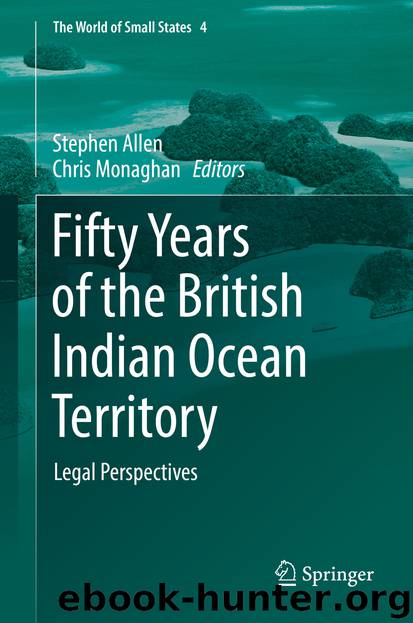Fifty Years of the British Indian Ocean Territory by Stephen Allen & Chris Monaghan

Author:Stephen Allen & Chris Monaghan
Language: eng
Format: epub
Publisher: Springer International Publishing, Cham
This observation underscores the fundamental difference between the colonial clause declaration model, and the model for triggering human rights obligations otherwise. The former involves a special determination by the state; the latter does not. Given the broader context in which the statement is made, as part of an effort to challenge the applicability of the ECHR to it in Iraq, the UK is suggesting that its lack of freedom in the latter arrangement is problematic, given the freedom it is given in the former arrangement, and the ironic contrasting consequences of having relatively short-lived activities regulated by human rights law, but arrangements that are more long-standing (and often conceived to continue indefinitely) left outside legal regulation.
Setting aside the important matter that if the ‘effective control’ model for extraterritorial applicability were not to apply to non-colonial extraterritorial arrangements outside the territory of Council of Europe member states (e.g. in Iraq), then there would be no possibility of applicability at all to such arrangements (so not the same—including as a matter of the UK’s freedom of choice—as the colonial clause model, where applicability can happen, if the UK so wishes),50 as a matter of principle the contradiction identified by the UK can be resolved in two different directions. An argument can be made the other way around from what is suggested: the fact that states do not determine whether their obligations are applicable to their extraterritorial activities outside the colonial context, and yet these activities might be shorter in duration than continuing colonial arrangements, might call into question the continuing validity of the older, discretionary model operating for colonial territories.
However, this alternative argument has to reckon with the continued existence of colonial clause provisions and the received wisdom up to Quark that for overseas territories the question of a colonial clause extension is exclusively determinative. The UK could make its submission, in favour of one of the two possible means of resolving the contradiction, because this legal settlement necessarily rules out a challenge to the continued validity of the colonial clause model.
The Strasbourg Court effectively rejected the UK’s argument, stating in its judgment of 2011 that the existence of the colonial clause:[W]hich was included in the Convention for historical reasons, cannot be interpreted in present conditions as limiting the scope of the term “jurisdiction” in Article 1.51
Download
This site does not store any files on its server. We only index and link to content provided by other sites. Please contact the content providers to delete copyright contents if any and email us, we'll remove relevant links or contents immediately.
The Social Psychology of Inequality by Unknown(3029)
The Plant Paradox by Dr. Steven R. Gundry M.D(2620)
The Writing on the Wall by Anselm Jappe(2045)
Working for Yourself by J.D. (Nolo) Stephen Fishman(1872)
Get What's Yours for Medicare by Philip Moeller(1738)
Every Landlord's Legal Guide by Janet Portman & Stewart Marcia & Ralph Warner(1675)
The First 20 Hours: How to Learn Anything ... Fast by Kaufman Josh(1665)
ADHD on Trial by Michael Gordon(1577)
Decisive by Chip Heath(1567)
Working for Yourself by Stephen Fishman J.D. (Nolo)(1528)
Drafting Contracts: How and Why Lawyers Do What They Do, Second Edition by Stark Tina L(1499)
A Practical Guide to International Arbitration in London by Hilary Heilbron(1440)
The Lord of the Rings: The Fellowship of the Ring, the Two Towers, the Return of the King by J. R. R. Tolkien(1439)
The Economist Aug 8th 2015 by The Economist(1427)
Restitution by Restitution(1427)
Intellectual Property Strategy by John Palfrey(1425)
The Economist Aug 29th 2015 by The Economist(1391)
Collusion by Luke Harding(1323)
Persuasion by Owner(1295)
